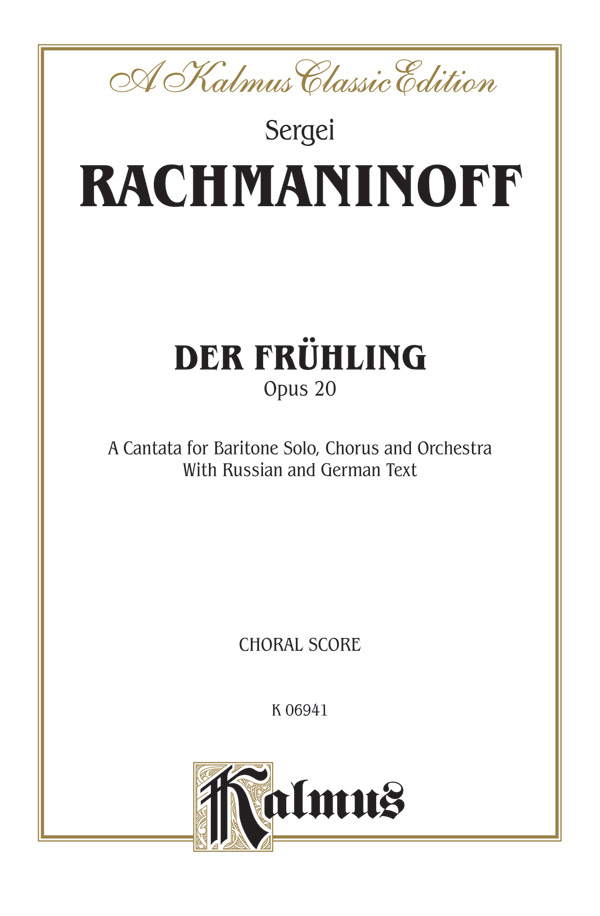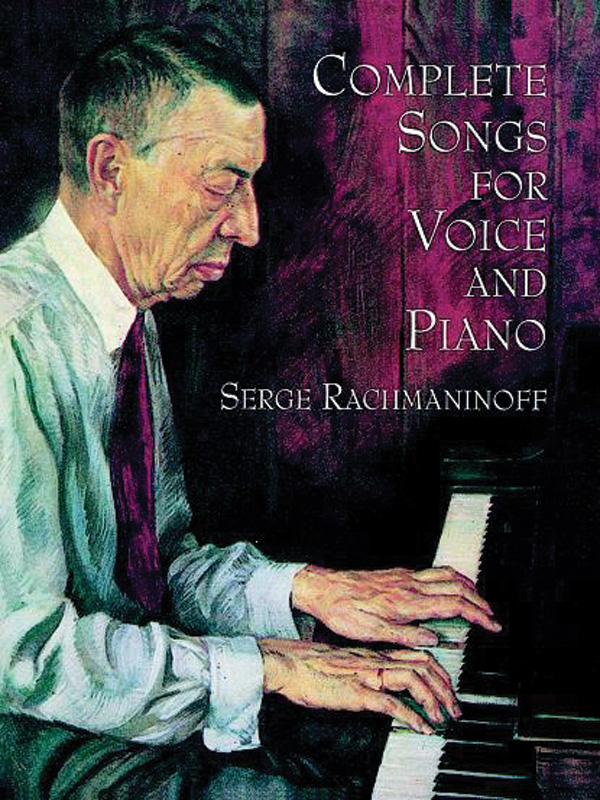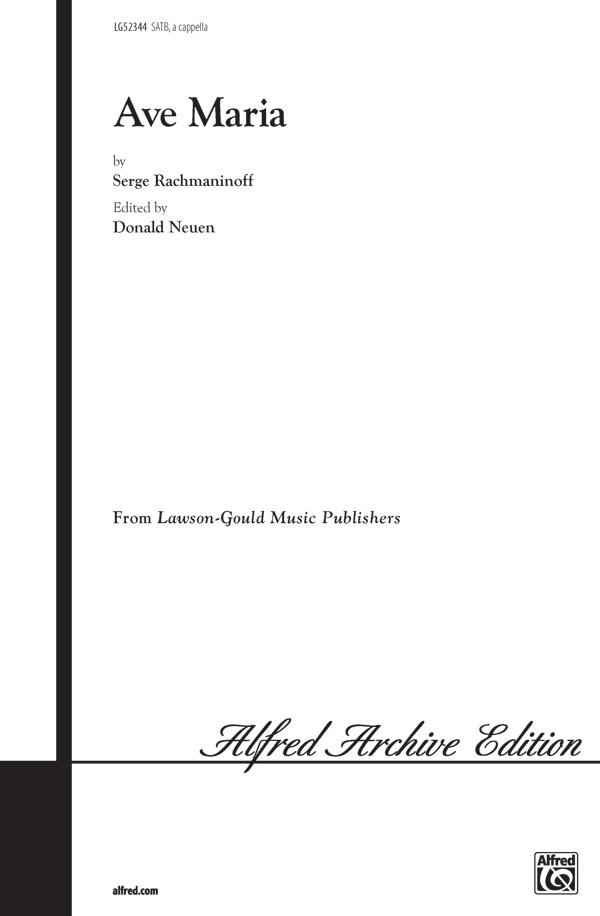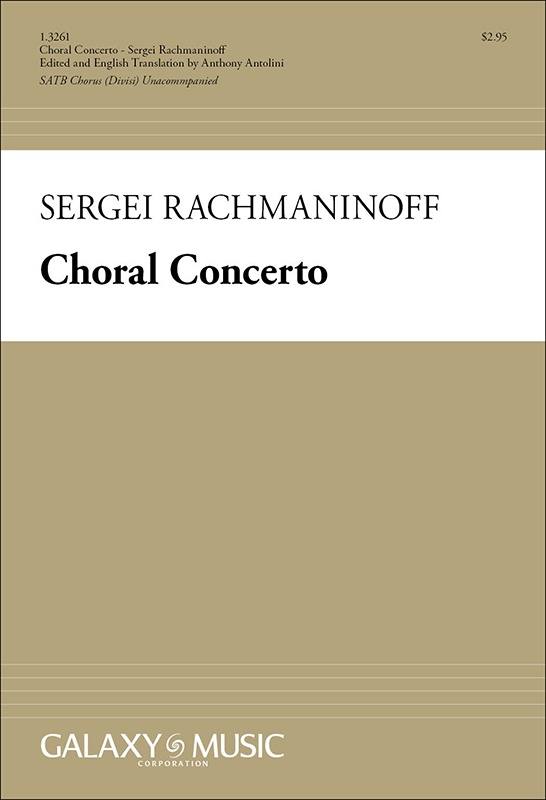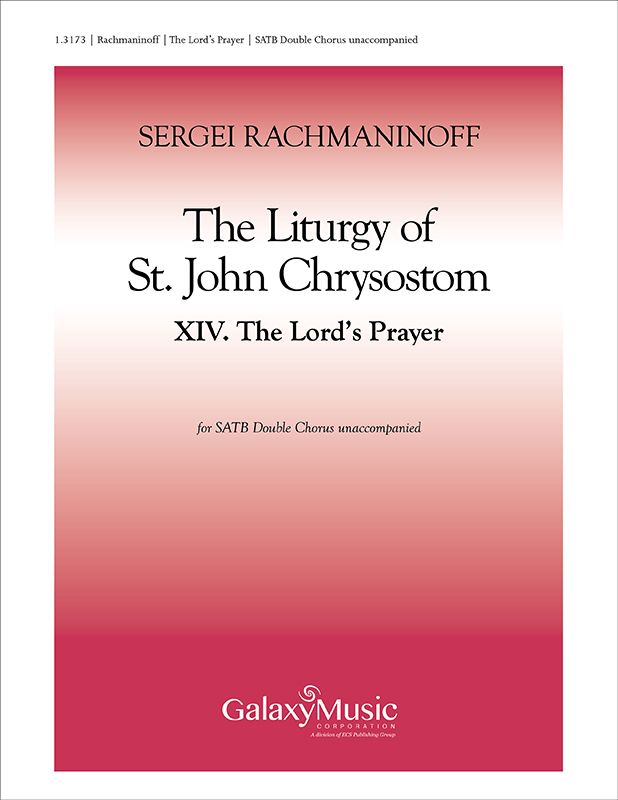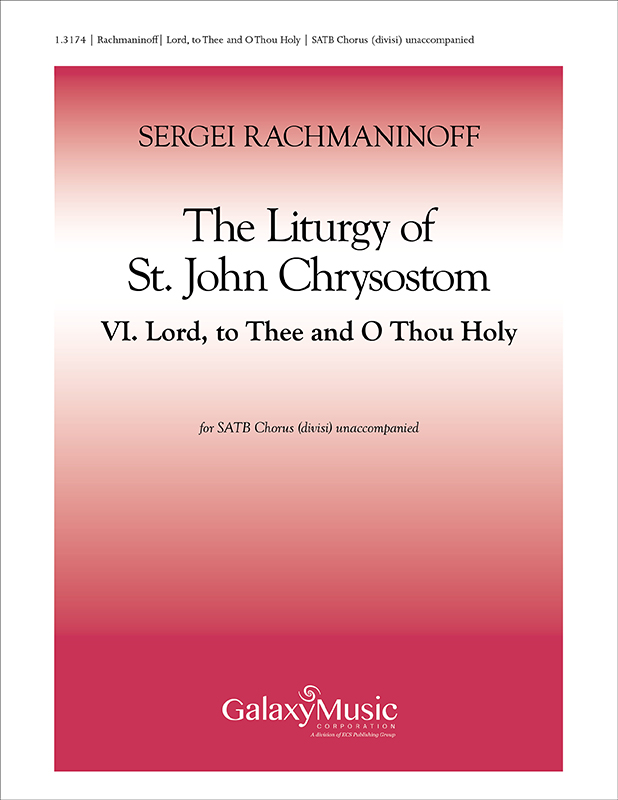In Celebration of the Human Voice - The Essential Musical Instrument
Home | Doo Wop | Barbershop | World | Contemporary | Christian | Vocal Jazz | Choral | Christmas | Instructional | Arrangements
Classical | Opera | Musicals | Personality | Young Singers | Disney | Videos | Songs | The Artists

Sergei Rachmaninoff
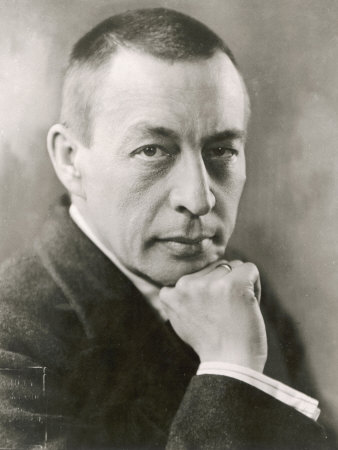
Sergei Rachmaninov (also spelled Rachmaninoff) was a legendary Russian composer and pianist who emigrated after the Communist revolution of 1917, and became one of the highest paid concert stars of his time, and one of the most influential pianists of the 20th century. He was born Sergei Vasilevich Rachmaninov on April 2, 1873, on a large estate near Novgorod, Russia. He was the fourth of six children born to a noble family, and lived in a family estate, where he enjoyed a happy childhood. He studied music with his mother from age 4; continued at the St. Petersburg Conservatory, and then graduated from the Moscow Conservatory in 1892, winning the Great Gold Medal for his new opera "Aleko." He was highly praised by Pyotr Ilyich Tchaikovsky , who promoted Rachmaninov's opera to the Bolshoi Theater in 1893. But the disastrous premiere of his 1st Symphony, poorly conducted by A. Glazunov, coupled with his distress over the Russian Orthodox Church's pressure against his marriage, caused him to suffer from depression, which interrupted his career for three years until he sought medical help in 1900. He had a three-month treatment by a hypnotherapist, aimed at overcoming his writer's block. Upon his recovery, Rachmaninov composed his brilliant 2nd Piano Concerto, and made a comeback with successful concert performances. From 1904-1906 he was a conductor at the Bolshoi Theater in Moscow. |
Arrangements | Recordings
Songbooks, Arrangements and/or Media
Displaying 1-6 of 6 items.
Sergei Rachmaninoff : Vocalise Op. 34, No. 14 Part of the 3-keys-in-1 Series, featuring three keys in one edition: High voice (c-sharp minor); Medium voice (b minor); Low voice (g minor). Includes a preface by Gordon Stewart (vocal coach at the Guildhall School of Music and Drama, London) and provides historical context and a guide to performance Sergei Rachmaninoff : Vocalise Op. 34 No. 14 Rachmaninoff composed his collection of 13 songs Op. 34 in 1912, but it was only three years later that he added a little closing piece without any text: the Vocalise, which soon outshone the other songs in terms of popularity and renown. Since its first performance in 1916 this expressive, melancholy piece has circulated in countless arrangements by others. Rachmaninoff himself made an arrangement for orchestra and voice, as well as one for orchestra alone. Henle's Urtext edition contains the original version for high voice and piano, and is based on the autograph sources in the Glinka Museum in Moscow. A particular highlight is the separate vocal part that not only serves singers well but also all those instrumentalists who wish to play this wonderful piece using the original solo part. Sergei Rachmaninoff : Der Frühling, Opus 20 A Cantata for Baritone Solo, Chorus and Orchestra with Russian and German text, by Sergei Rachmaninoff. Sergei Rachmaninoff : The Bells, Opus 35 Rachmaninoff wrote his Opus 35, "The Bells," as a choral symphony in 1913. The words are adapted from the Edgar Allan Poe poem by the same name. Includes: Allegro, ma non tanto * Lento * Presto * Lento Lugubre. Vocal score, soloists and chorus, with piano accompaniment. Text in Russian, German and English. Sergei Rachmaninoff : Complete Songs for Voice and Piano Rich collection of 71 compositions, including some of the most hauntingly beautiful passages in vocal literature. Exciting treasury of glorious songs-Opp. 4, 14, 21, 26, 34, and 38-have been reproduced from authoritative sources in a convenient, one-volume edition; most lyrics in Russian (Cyrillic) with English translations. A superb collection to be prized by pianists, vocalists, and countless lovers of fine music everywhere. Sergei Rachmaninoff : All-Night Vigil Long known inaccurately as Vespers, this masterpiece draws on Orthodox chant and the performance tradition of Russian folk music. This edition offers a new transliteration of the Church Slavonic text. For the first time an audio pronunciation guide is provided online. |
Displaying 1-20 of 20 items.
Blagosloven Yesi, Gospodi (Blessed Art Thou, O Lord) is a work by Sergei Rachmaninoff for Unaccompanied SATB Choir. From the 'All-Night Vigil,' this is the Vocal Score, featuring a pronunciation guide, and an explanation of the transliteration and translation. The lyrics are in the original and a phonetic transliteration.
Blagoslovi, Dushè Moya, Gospoda (Bless The Lord, O My Soul) is a work by Sergei Rachmaninoff for Solo Alto Voice and Unaccompanied SATB Choir. From the 'All-Night Vigil,' this is the Vocal Score, featuring a pronunciation guide, and an explanation of the transliteration and translation. The lyrics are in the original and a phonetic transliteration.
Blazhèn Muzh (Blessed Is The Man) is a work by Sergei Rachmaninoff for Unaccompanied SATB Choir. From the 'All-Night Vigil,' this is the Vocal Score, featuring a pronunciation guide, and an explanation of the transliteration and translation. The lyrics are in the original and a phonetic transliteration.
Bogoroditsè Devo (Rejoice, O Virgin) is a work by Sergei Rachmaninoff for Unaccompanied SATB Choir. From the 'All-Night Vigil,' this is the Vocal Score, featuring a pronunciation guide, and an explanation of the transliteration and translation. The lyrics are in the original and a phonetic transliteration.
Dnes' Spaseniye (Today Is Salvation) is a work by Sergei Rachmaninoff for Unaccompanied SATB Choir. From the 'All-Night Vigil,' this is the Vocal Score, featuring a pronunciation guide, and an explanation of the transliteration and translation. The lyrics are in the original and a phonetic transliteration.
Voskreseniye Khristovo Videfshè (In That We Have Beheld The Resurrection Of Christ) is a work by Sergei Rachmaninoff for Unaccompanied SATB Choir. From the All-Night Vigil, this is the Vocal Score, featuring a pronunciation guide, and an explanation of the transliteration and translation. The lyrics are in the original language with a phonetic transliteration.
Khvalite Imya Gospodne (Praise The Name Of The Lord) is a work by Sergei Rachmaninoff for Unaccompanied SATB Choir. From the 'All-Night Vigil,' this is the Vocal Score, featuring a pronunciation guide, and an explanation of the transliteration and translation. The lyrics are in the original and a phonetic transliteration.
Magnificat & Nunc Dimittis is a work by Sergei Rachmaninoff for Unaccompanied SATB Choir. From the 'All-Night Vigil,' this is the Vocal Score, featuring a pronunciation guide, and an explanation of the transliteration and translation. The lyrics are in the original and a phonetic transliteration.
Priidite, Poklonimsya (O Come, Let Us Worship) is a work by Sergei Rachmaninoff for Unaccompanied SATB Choir. From the 'All-Night Vigil,' this is the Vocal Score, featuring a pronunciation guide, and an explanation of the transliteration and translation. The lyrics are in the original and a phonetic transliteration.
Shestopsalmiye (Verses Before The Six Psalms) is a work by Sergei Rachmaninoff for Unaccompanied SATB Choir. From the 'All-Night Vigil,' this is the Vocal Score, featuring a pronunciation guide, and an explanation of the transliteration and translation. The lyrics are in the original and a phonetic transliteration.
Slavosloviye Velikoye (The Great Doxology) is a work by Sergei Rachmaninoff for Unaccompanied SATB Choir. From the 'All-Night Vigil,' this is the Vocal Score, featuring a pronunciation guide, and an explanation of the transliteration and translation. The lyrics are in the original and a phonetic transliteration.
Svete Tikhiy (O Gladsome Radiance) is a work by Sergei Rachmaninoff for unaccompanied SATB choir. From the All-Night Vigil, this is the Vocal Score, featuring a pronunciation guide, and an explanation of the transliteration and translation. The lyrics are in the original language with a phonetic transliteration.
Rachmaninoff knew how to make a melody turn and stretch and draw the listener in to its flow. This arrangement for treble choir lets the voices carry the famous tune, sharing in harmony or even moving into counterpoint at times. Veteran pianist Jan Sanborn supplied her expertise to the piano accompaniment. A great concert choice for treble choirs of all ages. Easy to medium in difficulty.
Arranger: Allan Robert Petker
Voskres Iz Groba (When Thou Hadst Risen Again) is a work by Sergei Rachmaninoff for Unaccompanied SATB Choir. From the 'All-Night Vigil,' this is the Vocal Score, featuring a pronunciation guide, and an explanation of the transliteration and translation. The lyrics are in the original and a phonetic transliteration.
Vzbrannoy Voyevode (To Thee, The Victorious Leader) is a work by Sergei Rachmaninoff for Unaccompanied SATB Choir. From the 'All-Night Vigil,' this is the Vocal Score, featuring a pronunciation guide, and an explanation of the transliteration and translation. The lyrics are in the original and a phonetic transliteration.
![]() Vocal Harmony Arrangements - Home
Vocal Harmony Arrangements - Home
Christian | Gospel | Standards | Musicals | Specialty | World | Barbershop | Contemporary | Vocal Jazz | Choral | Christmas
Mixed Voices | Female | Male | 8 Parts | 6 Parts | 5 Parts | 3 Parts | 2 Parts | Medleys | Solo | Folio Series | New Releases
Select a Category |
Want to Sing? - Find a Chorus Near You
List of Choruses by State | List of Choruses by City



